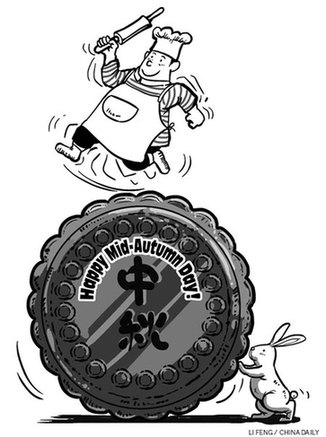Delicacy is no longer a piece of cake
Updated: 2012-09-28 08:08
By Li Yang (China Daily)
|
||||||||
The new Food Additives Usage Standards implemented last year banned 27 food additives. The new rules allow the use of only 10 kinds of milder additives in moon cakes. More importantly, they stipulate the ceilings for the use of additives. As a result, the shelf life of moon cakes, representative of Mid-Autumn Festival, has been reduced from 120 to 60 days this year.

Moon cakes with a shorter shelf life should be good news for consumers. A woman in Chongqing, for example, reportedly found a dust-covered packet of moon cakes in her storeroom last year. Their tender crust and fillings looked no different from the fresh ones. The only difference was they were made in 2003, which means moon cakes with stronger additives can actually be stored and sold a year or two later with consumers tasting little or no difference.
But consumers have reason to believe that even the new regulation cannot ensure all moon cakes are safe to eat, especially the ones with longer shelf lives.
Now it is up to the food safety authorities to explain to consumers how harmful an additive is to people's health so as to raise their awareness. This is important because food producers give the scientific names of the additives they use and people have no idea how harmful they are.
In previous years, the shelf lives of moon cakes depended on the amount of additives used. There is no specific regulation on quality guarantee periods for moon cakes with different fillings. For example, many moon cakes with fruit fillings - from coconut to lotus seeds - are actually stuffed with pureed wax gourd with additives of different fruit flavors, because bakeries have found that wax gourd is not only cheap and easy to preserve, but also mixes well with different food additives.
Such fraudulent practices, a byproduct of outdated standards and slack supervision, has continued for long. So despite the list of additives and limits of their use, the shelf lives of some moon cakes can be long enough to harm people's health.
Until now, the authorities have relied on random checks to supervise moon cake makers and ensure that they abide by the new standards. But that is not enough to solve the problem.
Some bakeries and dealers recycle the moon cakes that were made years ago. These moon cakes taste no different from the fresh ones, because of their sugar and fat content. Eating such moon cakes with high doses of food additives may not cause immediate discomfort. Yet they can be toxic.
About 280,000 tons of moon cakes were produced in China last year. Hence, food safety authorities should take stronger measures to protect consumers' health and regulate the moon cake industry. They must chalk out and enforce more detailed and well-targeted rules for the use of food additives, and carry out more frequent and intensive checks.
Since moon cakes are made in several stages and require many ingredients that are bought from different sources, the food safety inspections should not be limited to only bakeries. Companies and individuals that supply the fillings and other ingredients should also come under the purview of food safety checks. In fact, each link in the production chain has to be monitored and supervised.
The new standards have brought about some positive changes. But the moon cake sector's problems have developed over the years and cannot be solved overnight.
If effective supervision is carried out, the new rules could cause a real change in the moon cake sector. And the change would be conducive to promoting a healthy market and weeding out unscrupulous moon cake makers, which will benefit consumers and enterprises both.
The author is a writer with China Daily.
liyang@chinadaily.com.cn

 Relief reaches isolated village
Relief reaches isolated village
 Rainfall poses new threats to quake-hit region
Rainfall poses new threats to quake-hit region
 Funerals begin for Boston bombing victims
Funerals begin for Boston bombing victims
 Quake takeaway from China's Air Force
Quake takeaway from China's Air Force
 Obama celebrates young inventors at science fair
Obama celebrates young inventors at science fair
 Earth Day marked around the world
Earth Day marked around the world
 Volunteer team helping students find sense of normalcy
Volunteer team helping students find sense of normalcy
 Ethnic groups quick to join rescue efforts
Ethnic groups quick to join rescue efforts
Most Viewed
Editor's Picks

|

|

|

|

|

|
Today's Top News
Health new priority for quake zone
Xi meets US top military officer
Japan's boats driven out of Diaoyu
China mulls online shopping legislation
Bird flu death toll rises to 22
Putin appoints new ambassador to China
Japanese ships blocked from Diaoyu Islands
Inspired by Guan, more Chinese pick up golf
US Weekly

|

|






